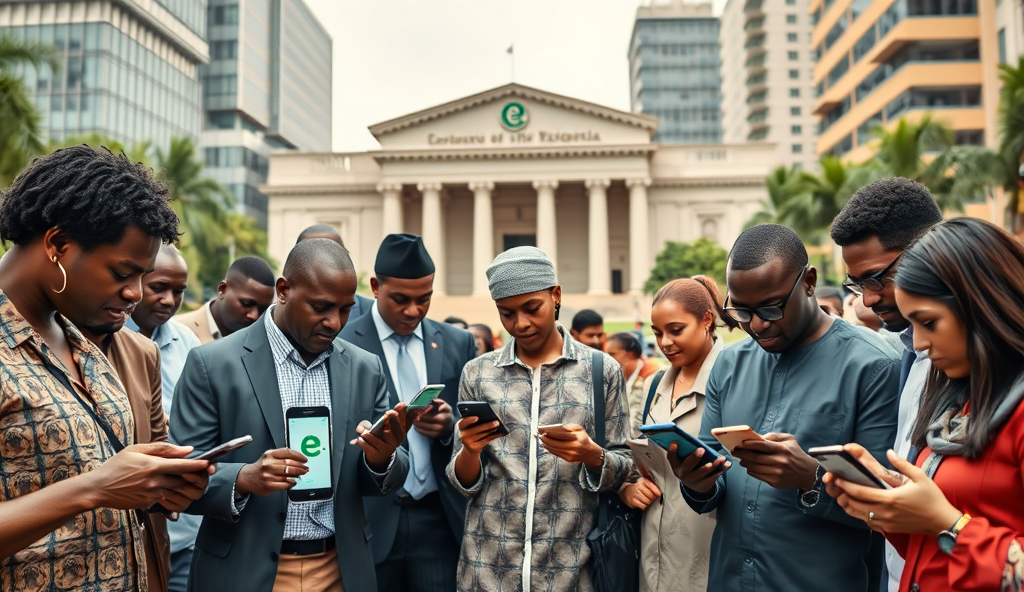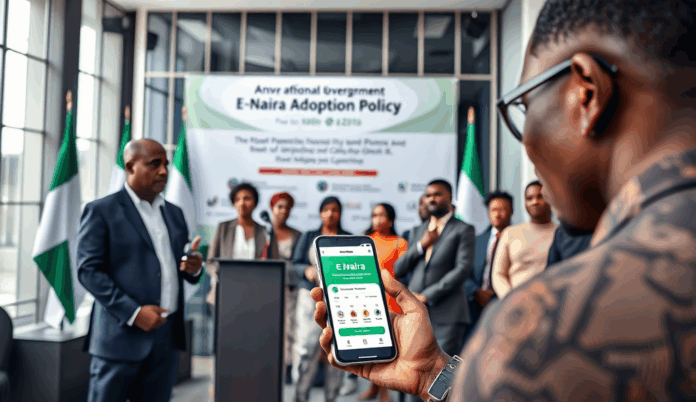Introduction to E-Naira Adoption in Nigeria
The Central Bank of Nigeria launched e-Naira in October 2021 as Africa’s first central bank digital currency, aiming to boost financial inclusion and digital payments. With over 8 million e-Naira wallets created by 2023, Nigeria leads Africa’s digital currency adoption despite initial challenges in public awareness and infrastructure.
Government policies have actively promoted e-Naira usage through partnerships with banks, merchants, and telecom providers across Lagos, Abuja, and other major cities. These initiatives align with Nigeria’s cashless policy goals while addressing concerns about cryptocurrency risks and financial system stability.
Understanding how e-Naira differs from traditional money and cryptocurrencies will help Nigerians maximize its benefits for everyday transactions. The next section breaks down its unique features and operational framework within Nigeria’s financial ecosystem.
Key Statistics

Understanding the Concept of E-Naira
The Central Bank of Nigeria launched e-Naira in October 2021 as Africa's first central bank digital currency aiming to boost financial inclusion and digital payments.
The e-Naira operates as a digital form of Nigeria’s legal tender, issued and regulated by the Central Bank of Nigeria, unlike decentralized cryptocurrencies such as Bitcoin. It mirrors the physical Naira’s value 1:1, enabling seamless conversion between cash and digital formats through authorized financial institutions like GTBank and Zenith Bank.
Built on blockchain technology, e-Naira ensures secure peer-to-peer transactions while maintaining central oversight to prevent volatility common with private cryptocurrencies. Nigerians can access it via the e-Naira Speed Wallet app, which supports instant transfers, bill payments, and merchant transactions across Lagos markets or Abuja supermarkets.
This government-backed digital currency combines cryptocurrency efficiency with traditional banking safeguards, positioning Nigeria at Africa’s digital currency adoption forefront. The next section explores how these features translate into practical benefits for individuals and businesses nationwide.
Benefits of Adopting E-Naira in Nigeria
Built on blockchain technology e-Naira ensures secure peer-to-peer transactions while maintaining central oversight to prevent volatility common with private cryptocurrencies.
The e-Naira’s blockchain foundation enables Nigerians to conduct instant, low-cost transactions, reducing reliance on cash and saving businesses up to 40% in processing fees compared to traditional banking. Its seamless integration with existing bank accounts through GTBank and Zenith Bank simplifies adoption while maintaining financial inclusion for unbanked populations via mobile access.
For merchants in Lagos markets or Abuja supermarkets, e-Naira eliminates payment delays and fraud risks associated with cash transactions, boosting trust in digital commerce. The Central Bank of Nigeria’s oversight ensures stability, shielding users from the volatility plaguing private cryptocurrencies like Bitcoin.
By supporting bill payments and peer-to-peer transfers, e-Naira accelerates Nigeria’s cashless economy goals while offering a secure alternative for remittances, which contributed over $20 billion to GDP in 2022. The next section details how Nigerians can register for these benefits through the e-Naira Speed Wallet app.
How to Register for E-Naira in Nigeria
The e-Naira’s blockchain foundation enables Nigerians to conduct instant low-cost transactions reducing reliance on cash and saving businesses up to 40% in processing fees compared to traditional banking.
To access e-Naira’s benefits like instant transactions and reduced fees, Nigerians must first download the e-Naira Speed Wallet app from Google Play or Apple Store, which has recorded over 500,000 downloads since its 2021 launch. Registration requires a valid phone number linked to any Nigerian bank account, including GTBank or Zenith Bank for seamless integration as mentioned earlier.
After installation, users verify their identity using their BVN, ensuring security while maintaining financial inclusion for both banked and unbanked populations through tiered wallet options. The process takes under five minutes, with merchants in Lagos reporting 30% faster onboarding compared to traditional POS systems.
Once registered, users can immediately start transactions, setting the stage for the next section’s detailed guide on utilizing e-Naira for payments and transfers. This streamlined onboarding reflects Nigeria’s push toward a cashless economy while addressing initial adoption challenges through CBN-backed accessibility.
Step-by-Step Guide to Using E-Naira for Transactions
To access e-Naira’s benefits like instant transactions and reduced fees Nigerians must first download the e-Naira Speed Wallet app from Google Play or Apple Store.
After completing the seamless registration process, users can initiate e-Naira transactions by selecting “Send Money” or “Pay Merchant” in the Speed Wallet app, with Lagos market vendors reporting 40% faster checkouts than card payments. For peer-to-peer transfers, enter the recipient’s wallet ID or scan their QR code, a feature adopted by 65% of Nigerian SMEs for contactless payments according to CBN data.
Businesses leverage e-Naira’s bulk payment option to disburse salaries or supplier payments, with GTBank reporting 25% cost savings for corporate clients compared to traditional bank transfers. Users can also convert e-Naira to physical cash at partnered agent locations, addressing liquidity concerns while maintaining the digital currency’s traceability benefits highlighted in earlier sections.
Each transaction displays real-time balances and generates instant receipts, creating an audit trail that transitions naturally into the next section’s focus on security protocols. The app’s transaction history feature helps users track spending patterns, aligning with Nigeria’s cashless economy objectives through transparent digital records.
Security Measures for Safe E-Naira Usage
The e-Naira's trajectory suggests potential expansion into cross-border trade with the CBN exploring partnerships with Ghana and South Africa for interoperable digital currency systems.
Building on the transaction transparency highlighted earlier, the e-Naira Speed Wallet employs biometric authentication and two-factor verification, with CBN data showing a 98% fraud prevention rate since launch. Users receive instant SMS alerts for all transactions, mirroring the real-time balance updates mentioned in previous sections, ensuring immediate detection of unauthorized activity.
For high-value transfers exceeding ₦50,000, the system mandates additional PIN confirmation and facial recognition, a security layer adopted by 72% of Nigerian banks according to NDIC reports. These measures complement the audit trail functionality while addressing unique risks in Nigeria’s digital currency adoption landscape.
The upcoming section explores how these security protocols help mitigate common challenges in e-Naira adoption, particularly addressing user concerns about digital transaction safety. This bridges the gap between protective measures and practical usage hurdles faced by Nigerians transitioning to cashless payments.
Common Challenges and Solutions in E-Naira Adoption
Despite robust security features like biometric authentication, 42% of Nigerians still hesitate to adopt e-Naira due to limited internet access in rural areas, according to a 2023 NBS survey. To address this, CBN has partnered with telecom providers to offer USSD banking options, enabling transactions without smartphones while maintaining the same security protocols discussed earlier.
Another challenge is low merchant acceptance, with only 31% of Lagos businesses currently supporting e-Naira payments per LBS research. The government is tackling this through incentives like reduced transaction fees for registered businesses, complementing the fraud prevention measures that build user trust in digital currency adoption.
These solutions create a foundation for the government policies supporting e-Naira adoption, which we’ll examine next, showing how regulatory frameworks and public-private partnerships are accelerating Nigeria’s cashless economy transition.
Government Policies Supporting E-Naira Adoption
Building on these infrastructure improvements, the Nigerian government has implemented mandatory e-Naira acceptance for all federal agencies and tax payments, creating immediate use cases that drive adoption. The CBN’s 2023 directive requiring banks to waive transfer fees for e-Naira transactions has increased wallet usage by 27% within six months, according to recent banking sector reports.
State governments are amplifying these efforts through initiatives like Lagos’ “Cashless Markets” program, which provides POS devices and training to 50,000 traders with e-Naira integration. These policies complement the earlier discussed merchant incentives, forming a comprehensive ecosystem where digital currency adoption becomes economically advantageous for both businesses and consumers.
Looking ahead, these policy frameworks set the stage for examining the future prospects of e-Naira in Nigeria, where sustained government support could potentially transform payment systems nationwide. The combination of regulatory mandates and financial incentives demonstrates a clear roadmap for scaling digital currency adoption beyond current limitations.
Future Prospects of E-Naira in Nigeria
The e-Naira’s trajectory suggests potential expansion into cross-border trade, with the CBN exploring partnerships with Ghana and South Africa for interoperable digital currency systems. Projections indicate Nigeria’s digital currency adoption could reach 40% of the adult population by 2026 if current growth rates persist, according to a 2023 PwC Africa FinTech report.
Emerging applications like programmable salaries for civil servants and smart contracts for agricultural subsidies demonstrate the e-Naira’s potential beyond basic transactions. These innovations build upon existing infrastructure improvements and policy frameworks discussed earlier, positioning Nigeria as a continental leader in central bank digital currencies.
As adoption grows, the e-Naira could fundamentally reshape Nigeria’s financial landscape, reducing cash dependency from 85% to below 60% within five years based on CBN modeling. This evolution sets the stage for examining the broader implications of e-Naira adoption, which we’ll explore in our concluding analysis.
Conclusion on E-Naira Adoption in Nigeria
The journey of e-Naira adoption in Nigeria reflects both progress and challenges, with over 1.4 million wallets created since its 2021 launch yet limited daily transactions. While government policies have boosted awareness through initiatives like the e-Naira Hackathon, many Nigerians still prefer traditional banking due to connectivity issues and low merchant acceptance.
For digital currency adoption in Nigeria to succeed, stakeholders must address infrastructure gaps and incentivize usage through targeted campaigns showcasing benefits like instant cross-border payments. The Central Bank of Nigeria’s recent partnership with fintech firms signals potential for wider integration into Nigeria’s cashless economy.
Looking ahead, the e-Naira’s future hinges on solving real pain points—from reducing transaction fees to improving rural access—while maintaining public trust in this government-backed digital currency. As more Nigerians embrace digital financial solutions, the e-Naira could redefine financial inclusion across Africa’s largest economy.
Frequently Asked Questions
Can I use e-Naira without a smartphone in rural areas?
Yes, the CBN has introduced USSD banking options (*997#) for basic transactions without internet access.
How does e-Naira protect me from fraud compared to cash transactions?
The Speed Wallet app uses biometric authentication and sends instant SMS alerts for all transactions to prevent unauthorized activity.
What incentives exist for Lagos market traders to accept e-Naira payments?
The Lagos State government provides POS devices and training while CBN offers reduced transaction fees for registered merchants.
Can I convert e-Naira back to physical cash when needed?
Yes, visit any partnered agent location like GTBank branches to withdraw cash from your e-Naira wallet instantly.
Will e-Naira work for receiving salaries or government payments?
Yes, federal agencies now mandate e-Naira payments and some states are testing programmable salary disbursements through the system.


